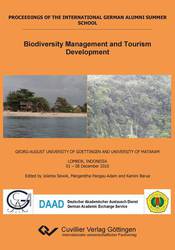| Areas | |
|---|---|
| Serie de libros (97) |
1381
|
| Nachhaltigkeit |
3
|
| Gesundheitswesen |
1
|
| Letra |
2369
|
| Ciencias Naturales |
5408
|
| Matemática | 229 |
| Informática | 319 |
| Física | 980 |
| Química | 1364 |
| Geociencias | 131 |
| Medicina humana | 243 |
| Estomatología | 10 |
| Veterinaria | 108 |
| Farmacia | 147 |
| Biología | 835 |
| Bioquímica, biología molecular, tecnología genética | 121 |
| Biofísica | 25 |
| Nutrición | 45 |
| Agricultura | 1005 |
| Silvicultura | 201 |
| Horticultura | 20 |
| Ecología y conservación de la tierra | 148 |
| Ciencias Ingeniería |
1795
|
| General |
98
|
|
Leitlinien Unfallchirurgie
5. Auflage bestellen |
|
Erweiterte Suche
Biodiversity Management and Tourism Development (Tienda española)
Kamini Barua (Autor)Margaretha Pangau-Adam (Autor)
Jolanta Slowik (Autor)
Previo
Lectura de prueba, PDF (76 KB)
Indice, PDF (43 KB)
Indonesia is a favourite ecotourism destination in Southeast Asia and tourism in general plays an important role in the Indonesian economy. Being one of the world’s largest archipelagos’, with more than 17,503 islands sprawling across the Indian Ocean, Indonesia is one of the third top global megabiodiversity hotspots with rich natural ecosystems ranging from rainforests to mangrove systems and a high degree of insular endemism. The Indonesian archipelago is divided into two ecological regions – the Sundaland (Asian zoogeographical region) and Wallacea (Australasian zoogeographical region) by the Wallace line. This line runs between the islands Bali and Lombok. Indonesia also boasts of a rich marine biodiversity with 20 % of the world’s coral reefs and is biogeographically a part of the coral triangle. Nearly 45 % of Indonesia is still covered by natural ecosystems and one of the reasons for this is that only 6000 out of the 17,000 islands are permanently inhabited. While Sumatra and Java are the most popular tourist destinations, Indonesia also has one of the world’s longest coastlines with popular beaches and island resorts in Bali, Lombok and Bintan islands. The waters around these islands also provide excellent and economical diving opportunities, with a very high coral diversity as for example in Bunaken Marine National Park in the northern tip of Sulawesi island and the Raja Ampat area in west Papua which according to Conservation International claims to have the highest marine diversity. Indonesia also has a rich cultural diversity with most of these cultural sites listed as world heritage sites. Ecotourism in Indonesia can be used not only as a tool for conservation of biodiversity but also to promote sustainable development especially for the local communities. While promoting ecotourism, it should also be seen that nature and culture are not harmed or destroyed. The International German Alumni Summer School aimed at addressing the issues of ecotourism potential and development in Indonesia and other countries in South-East Asia on an interdisciplinary platform and find solutions for sustainable and practically applicable nature conservation efforts.
| ISBN-13 (Impresion) | 9783954040926 |
| ISBN-13 (E-Book) | 9783736940925 |
| Formato | A5 |
| Idioma | Inglés |
| Numero de paginas | 240 |
| Laminacion de la cubierta | mate |
| Edicion | 1. Aufl. |
| Lugar de publicacion | Göttingen |
| Lugar de la disertacion | Göttingen |
| Fecha de publicacion | 09.07.2012 |
| Clasificacion simple | Tesis doctoral |
| Area |
Ecología y conservación de la tierra
|








